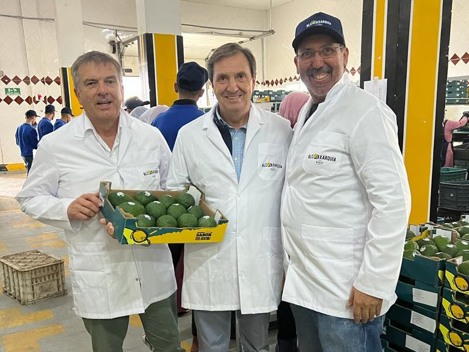Read in
“Morocco has become ‘the ninth Andalusian province’ for avocado production”
The Moroccan avocado campaign is underway with some volumes affected as a result of storm Bernard, although the impact on the country’s total volume won’t be very representative.
The first truckloads of Moroccan avocados are already departing from Alcoaxarquia Maroc’s new processing plant, located in Tangier, in a strategic position from an operational and logistical point of view.
Grupo Alcoaxarquia, based in Velez-Malaga, wished to make the most out of the Moroccan avocado campaign from the beginning. “We have worked really hard on preparing the infrastructure, human resources and the supply of materials, in coordination with our producers in the area, with whom we have been working in recent campaigns,” says Juan Becerra, managing director of Grupo Alcoaxarquia.
The avocado campaign in Morocco is expected to last until February or March 2024. Until then, the Moroccan subsidiary expects to handle and supply some 5,000 tons, which will go to various European markets.
“The harvest has been affected by the strong winds brought by storm Bernard, which caused some of the fruit to fall to the ground. At a more general level, the damage on the country’s production is limited, with damage only in some specific producing areas,” said Juan Becerra.
“The Hass avocado harvest has just started and the beginning of the season is somewhat comparable to that of the previous one, although we do expect a more stable development this year, without the increases in the prices at origin we saw last season,” he says.
“Morocco has become ‘the ninth Andalusian province’ for avocado production, because it is allowing us to extend the season in southern Spain. It is worth recalling that the expansion of avocado production in Spanish territory is increasingly limited by the lack of producing areas with the right climatic characteristics and a sufficient water supply,” said Juan Becerra.
“One of the reasons why we decided to set up a subsidiary in Morocco is the country’s agro-climatic conditions, similar to those of some production areas in Spain. Therefore, the Moroccan production complements the Spanish,” he says.
The water supply is also starting to become a challenge for Morocco, where the first restrictions are being implemented due to the impact of drought. “That is why we went ahead and took this step before the situation became more complicated. We are not aware of any other Spanish company having opened a subsidiary with a Moroccan corporate name before us,” he says.
The inauguration of the new plant was attended by the CEO of Grupo Alcoaxarquía, José Antonio Alconchel; the managing director, Juan Becerra, and Hasnaoui Aziz Choukri, a key partner in this new project, which is helping the group strengthen its presence in the production areas of both hemispheres. “Our business model says that ‘we market what we produce’, and this urges us to work as much as possible at farm level. We see this as the only way to guarantee the right volumes, quality and price,” says the CEO of Alcoaxarquia Group, José Antonio Alconchel.
 For more information:
For more information:
Juan Becerra
Grupo Alcoaxarquía
C/ Juan de Juanes, Parcelas 9-11 – Pol. Ind. La Mata
29700 Vélez-Málaga, Málaga. Spain
M: +34 670430122
T: +34 951 33 39 34
juan.becerra@alcoaxarquia.es
www.alcoaxarquia.com


